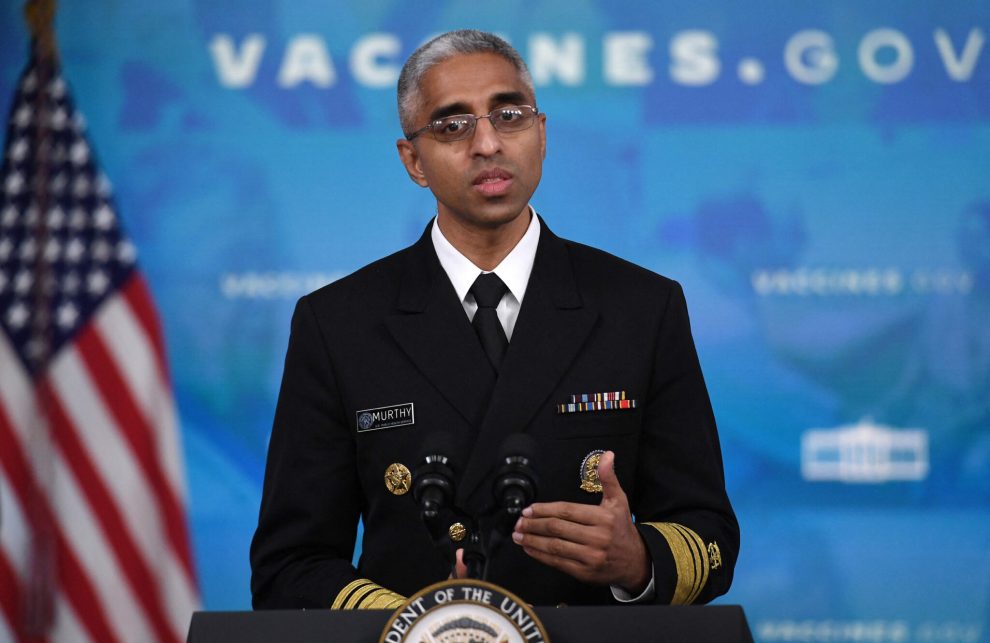The U.S. Surgeon General Vivek Murthy on Tuesday issued a public health advisory on the mental health issues he said youth are facing from the harsh lockdowns and other protocols put in place during the coronavirus pandemic.
“It would be a tragedy if we beat back one public health crisis only to allow another to grow in its place,” Murthy said in a preface written for the advisory. “Mental health challenges in children, adolescents, and young adults are real, and they are widespread. But most importantly, they are treatable, and often preventable.”
“Advisories are reserved for significant public health challenges that need the nation’s immediate awareness and action,” the document said
Murthy issued the advisory the day after he visited King/Drew Magnet High School of Medicine and Science in the Willowbrook area of South Los Angeles where students said they have struggled during the pandemic.
“A lot of people still feel like, everything is virtual, like, they act as if we can’t see or hear what they say,” Jesus El, a senior at the school said in a Los Angeles Times report. “A lot of students have been less motivated to come to school, you know, miss school more. I’m noticing a lot more students start to leave class and take long bathroom breaks.”
The Times reported on some of the statistics behind the claims about young people’s struggle:
Symptoms of depression and anxiety have doubled during the pandemic, with 25 percent f youth experiencing depressive symptoms and 20 percent experiencing anxiety symptoms, according to Murthy’s 53-page advisory. There also appear to be increases in negative emotions or behaviors such as impulsivity and irritability — associated with conditions such as attention deficit hyperactivity disorder or ADHD.
And, in early 2021, emergency department visits in the United States for suspected suicide attempts were 51% higher for adolescent girls and 4% higher for adolescent boys compared to the same time period in early 2019, according to research cited in the advisory.
Even before the pandemic, children from all backgrounds faced serious mental health challenges, Murthy said. But nearly two years of disruption took a toll and worsened their mental health — especially for such groups as immigrants, students with disabilities and students of color from low-income families.
The report also said that isolated young people make it “harder to recognize signs of child abuse, mental health concerns, and other challenges.”
The L.A. Unified School District has shortage of mental health professionals with a staffing goal falling short 500 social workers, according to the Times.
The national average of caseloads for school counselors was 424 students per counselor for the 2019-20 school year. Professional guidelines recommend 250 students per counselor.
“One good thing is that people are asking for help and trying to offer it to one another, even informally and without professional expertise,” school board member Tanya Ortiz Franklin said in the Times report. “But we are also recognizing the deep need for professional expertise.”
The UK’s envoy to the World Health Organization (W.H.O.) has condemned mass coronavirus lockdowns, slamming the “ghastly global catastrophe” caused by crashing the world economy. https://t.co/XT0n8fz3bY
— Breitbart News (@BreitbartNews) October 12, 2020
“The surgeon general has limited direct power, but traditionally speaks with medical expertise as the voice of the executive branch — a role that can be magnified by the individual in the office and the issues that person takes on,” the Times reported. “The surgeon general’s warning on tobacco products is a well-known example.”
This is the second advisory issued by Murthy serving under President Joe Biden. The first was about the “urgent threat” of “medical misinformation.”
This is also Murthy’s second time as Surgeon General. He was appointed by President Barack Obama and served at the post from 2014 to 2017.
The recommendations made in the advisory included:
• Create positive, safe, and affirming school environments.
• Expand social and emotional learning programs and other evidence-based approaches that promote healthy development.
• Learn how to recognize signs of changes in mental and physical health among students, including trauma and behavior changes. Take appropriate action when needed.
• Provide a continuum of supports to meet student mental health needs, including evidence- based prevention practices and trauma-informed mental health care.
• Expand the school-based mental health workforce.
• Support the mental health of all school personnel.
• Promote enrolling and retaining eligible children in Medicaid, CHIP, or a Marketplace plan, so that children have health coverage that includes behavioral health services.
• Protect and prioritize students with higher needs and those at higher risk of mental health challenges, such as students with disabilities, personal or family mental health challenges, or other risk factors (e.g., adverse childhood experiences, trauma, poverty).
Story cited here.
























